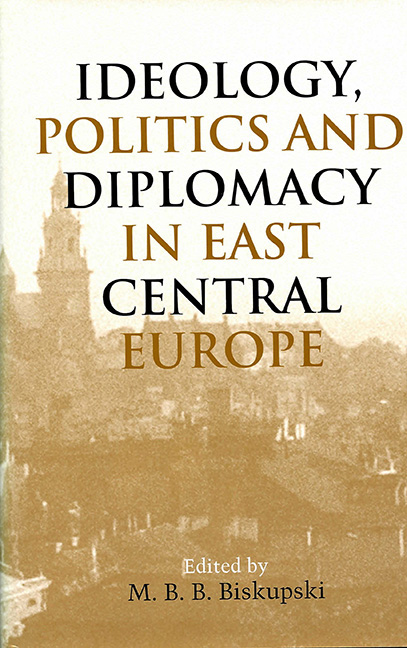Book contents
- Frontmatter
- Contents
- Preface
- Tabula Honoraria
- Piotr Wandycz
- Piotr Wandycz: An Appreciation
- 1 A Comparison of Czech Politics in Bohemia with Czech Politics in Moravia, 1860–1914
- 2 Strategy, Politics, and Suffering: The Wartime Relief of Belgium, Serbia, and Poland, 1914–1918
- 3 “This Troublesome Question”: The United States and the “Polish Pogroms” of 1918–1919
- 4 The Socialist Imprint on International Relations in Interwar Europe
- 5 Hungarian Americans during World War II: Their Role in Defending Hungary's Interests
- 6 The Nazi-Soviet Pact of August 23, 1939: When Did Stalin Decide to Align with Hitler, and Was Poland the Culprit?
- 7 Poland, the GDR, and the “Ulbricht Doctrine”
- Writings of Piotr S. Wandycz
- Contributors
- Index
5 - Hungarian Americans during World War II: Their Role in Defending Hungary's Interests
Published online by Cambridge University Press: 11 May 2017
- Frontmatter
- Contents
- Preface
- Tabula Honoraria
- Piotr Wandycz
- Piotr Wandycz: An Appreciation
- 1 A Comparison of Czech Politics in Bohemia with Czech Politics in Moravia, 1860–1914
- 2 Strategy, Politics, and Suffering: The Wartime Relief of Belgium, Serbia, and Poland, 1914–1918
- 3 “This Troublesome Question”: The United States and the “Polish Pogroms” of 1918–1919
- 4 The Socialist Imprint on International Relations in Interwar Europe
- 5 Hungarian Americans during World War II: Their Role in Defending Hungary's Interests
- 6 The Nazi-Soviet Pact of August 23, 1939: When Did Stalin Decide to Align with Hitler, and Was Poland the Culprit?
- 7 Poland, the GDR, and the “Ulbricht Doctrine”
- Writings of Piotr S. Wandycz
- Contributors
- Index
Summary
The “great economic emigration” from Hungary and East Central Europe lasted from the 1880s until World War I. It transferred nearly two million Hungarian citizens, among them about 650,000 Magyars, to the United States. The large majority of these immigrants were young working-age men who came as temporary “guest workers.” They hoped to make enough money during their short stay so that upon their repatriation they would be able to improve their lives and rise to a higher social status in their native country. Many of them did repatriate, a number of them—like birds of passage—several times over and over again. About three-fourths of them, however, opted to stay permanently in America. They remained for a variety of reasons, including economic, social, personal, and even political causes.
The last of these factors became especially significant after 1918, when Austria-Hungary's, and therein Historic Hungary's, dismemberment altered the political realities of East Central Europe. A majority of the Magyar immigrants had come from regions that after 1918 became part of such newly created or significantly enlarged successor states as Czechoslovakia, Yugoslavia, and Romania. Their return to their homelands would have meant that they would have had to accept a minority status in states that henceforth were to be ruled by Hungary's former minorities. Most of the immigrants were unable to face such a new reality. Nor could they return to the small country that remained Hungary after the Treaty of Trianon (June 4, 1920). The economic opportunities in post-Trianon Hungary were far short even of the conditions that the immigrants had left behind at the time of their original emigration to the United States.
Given the evaporation of the chances for repatriation, the attitude of Hungarian Americans also changed markedly. Their temporary presence in the United States increasingly assumed the characteristics of a permanent stay. Thus began their integration into American society. This process became particularly evident among the members of the younger generation, who had been born in the United States. While the immigrants were never really able to adjust fully to the peculiarities of American society, their native-born children became increasingly Americanized. They felt less and less kinship with the world of their immigrant parents, including the institutions and organizations the latter had founded during their purported “temporary stay” in the New World. These developments, however, held untold dangers for the immigrant generation.
- Type
- Chapter
- Information
- Ideology, Politics, and Diplomacy in East Central Europe , pp. 120 - 146Publisher: Boydell & BrewerPrint publication year: 2003

